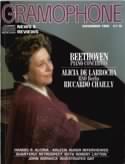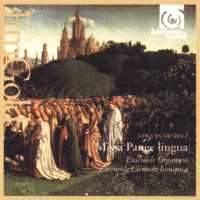Texte paru dans: / Appeared in: |
|
|
Outil de traduction (Très approximatif) |
|
|
Reviewer: David Fallows (Abbreviated)
Each new recording by the
Clement Janequin Ensemble these days is a major event. Their superbly
controlled and beautifully balanced singing leaves most other vocal groups
in the shade. Every line seems absolutely right… For what is unquestionably Josquin's most famous Mass, they use eight singers but with extended passages allocated to solo voices. The poise and clarity of the performance are wholly admirable. Perhaps the musicians could have allowed a little more space in those stunning opening solo lines of the Benedictus - lines which seem to be without historical precedent in their declamatory presentation -and to my ear they could have made considerably more out of the astonishing dissonances which close the Agnus Dei and look forward some 80 years to the Masses of Byrd. But then one of the main qualities in this performance is that there are no exaggerated musical gestures , and the decision to present everything with the utmost purity and control pays its own clear dividends. The musicians very quickly bring you right to the heart of Josquin's extraordinarily vivid creative mind.
Beyond that , the record also offers what seems to be an important novelty. Josquin 's Ordinary movements are interspersed with the Propers - appropriately for the Feast of Corpus Christi - sung by the Organum Ensemble under Marcel Pérès. The innovation is that their performance builds on the various late-medieval theorists who state that the more solemn the feast the more slowly you must sing chant. As sung with the intensely focused and steely sound of the Organum Ensemble, this has an extremely moving effect of a kind which I , at least, have not experienced before. For those interested in ways of singing and in styles of chant interpretation the record will be worth having for those tracks alone.
On the other
hand, I do feel, as I have felt with' other records which intersperse a
polyphonic Mass with chant Propers, that listeners may not always want to hear
the chants - in this case, because of the slow tempo, very long ones - whenever
they play Josquin's Mass Pange lingua; and they may, conversely, wish to hear
the chants without Josquin's polyphony...
|
|
|
|
|
|
Cliquez l'un ou l'autre
bouton pour découvrir bien d'autres critiques de CD |
|




